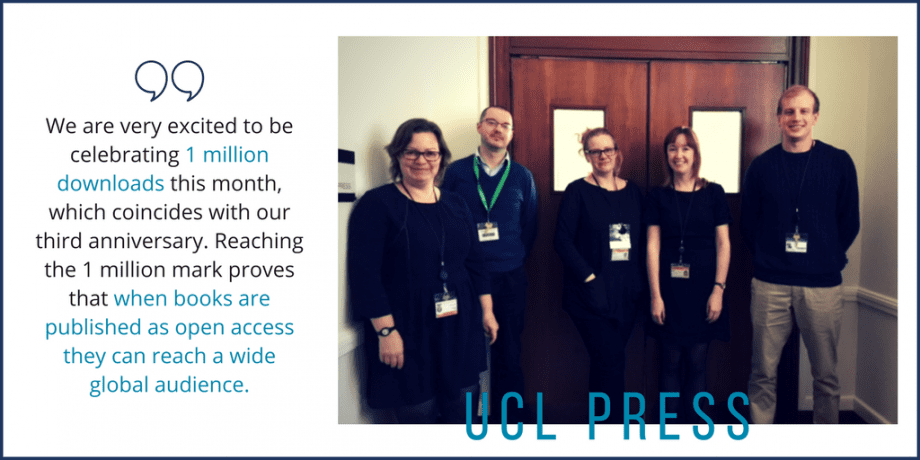As we gear up for the Library Publishing Forum and the start of a new membership year in July, we are publishing a series of member profiles. These profiles will showcase the wide variety of publishing work happening at member institutions, and celebrate our community’s contributions to the wider publishing landscape. Many thanks to the members who agreed to answer our questions! See all of the published profiles, and look for a new one each week until the Forum.
To learn more about their program, check out UCL’s latest Library Publishing Directory entry.
Tell us a bit about your publishing program.
UCL Press (University College London) launched in June 2015 as the first fully open access university press in the UK. It publishes scholarly monographs, textbooks and journals by both UCL and non-UCL authors and all our books and journals are made freely available to download, as well as being sold in print. Since launching, we’ve published 70 books and 8 journals. We have built particular strengths in publishing books on architecture and built environment, anthropology (including a very successful series on social media usage in different parts of the world), archaeology, history, education and sustainability. These subjects reflect some of the great strengths in UCL’s social sciences and humanities departments, with several ranked in the top 10 in the world, for example the UCL Institute of Education, the Bartlett School of Architecture and the Institute of Archaeology. We now publish around 35 books a year and aim to increase to around 40 or 45 next year.
Tell us something you have accomplished with your program that you’re proud of – big or small.
I am particularly proud that we have established a press that is a high-quality scholarly press in its own right and that attracts authors both from UCL and from all around the world. Many of our authors are motivated by our open access policy, but they also seek high-quality publishing services – from rigorous peer review, through copy-editing and strong marketing support – all the things that they would hope for from any other publisher. Many of our authors are now publishing their second and even third book with us, and our books are regularly reviewed in the national press. Strong publishing services, right from the acquisition stage, set up your future relationship with your authors and contribute to a positive reputation, and I think it’s crucial to provide such services alongside open access dissemination.
Pictured (from left to right): Lara Speicher (Publishing Manager), Chris Penfold (Commissioning Editor), Alison Fox (Marketing and Distribution Manager), Jaimee Biggins (Managing Editor), Ian Caswell (Journals Manager)
Looking ahead, what are you excited about, or what’s on the horizon for your program?
We are very excited to be celebrating 1 million downloads this month, which coincides with our third anniversary. We congratulate all of our authors who have published such interesting books that appeal to readers around the world, and we appreciate that they have collaborated with us on their promotion and dissemination. Reaching the 1 million mark proves that when books are published as open access they can reach a wide global audience. While our main audiences are in the UK and the US, we also see a significant audience in low- and middle-income countries and outside academia, which was a particular goal for UCL Press.
Tell us about an obstacle you are facing in your work or one that the field is facing as a whole.
Research England (formerly HEFCE), has signaled that in the Research Excellence Framework (the evaluation of UK universities’ research that takes place every 5-6 years and that determines their funding allocation) in around 2026, monographs will need to be made available in open access form in order to be eligible for submission to the REF. This will be a major shift for publishers and the sector is discussing how such a transition will be implemented and supported. This is perhaps better described as a challenge than an obstacle, and one which has the potential benefits of achieving greater visibility for many scholarly books.
Tell us about your experience participating in the community of library publishers. Has that experience influenced you or your work?
The community of library publishers is considerably more significant in the US than in the UK, so we are very grateful to receive news and information from the LPC network and to meet LPC members at conferences and have a chance to hear more about their inspiring work. As yet, there is no UK equivalent, although many of the newer open access university presses that have started up here in the last two or three years have emerged from libraries, and we share information through informal networks and occasional meetings. It will be interesting to see in the coming years whether the UK follows the same pattern of growth in this area that has taken place in the US – we certainly look to the trend for this in the US as a source of inspiration.
Lara Speicher, Publishing Manager, UCL Press
www.ucl.ac.uk/ucl-press

